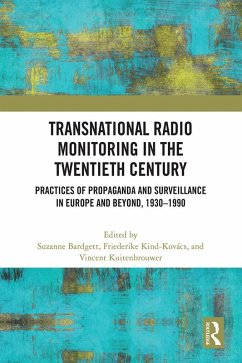
In the Name of Security - Secrecy, Surveillance and Journalism (eBook, ePUB)

PAYBACK Punkte
11 °P sammeln!
The terrorist attacks on the World Trade Center in New York on 11 September 2001 saw the start of the so-called war on terror. The aim of 'In the Name of Security - Secrecy, Surveillance and Journalism'is to assess the impact of surveillance and other security measures on in-depth public interest journalism. How has the global fear-driven security paradigm sparked by 11 September affected journalism? Moves by governments to expand the powers of intelligence and security organizations and legislate for the retention of personal data for several years have the potential to stall investigative jo...
The terrorist attacks on the World Trade Center in New York on 11 September 2001 saw the start of the so-called war on terror. The aim of 'In the Name of Security - Secrecy, Surveillance and Journalism'is to assess the impact of surveillance and other security measures on in-depth public interest journalism. How has the global fear-driven security paradigm sparked by 11 September affected journalism? Moves by governments to expand the powers of intelligence and security organizations and legislate for the retention of personal data for several years have the potential to stall investigative journalism. Such journalism, with its focus on accountability and scrutiny of powerful interests in society, is a pillar of democracy.
Investigative journalism informs society by providing information that enables citizens to have input into democratic processes. But will whistleblowers acting in public interest in future contact reporters if they risk being exposed by state and corporate surveillance? Will journalists provide fearless coverage of security issues when they risk jail for reporting them?
At the core of 'In the Name of Security - Secrecy, Surveillance and Journalism' sits what the authors have labeled the 'trust us dilemma'. Governments justify passing, at times, oppressive and far-reaching anti-terror laws to keep citizens safe from terror. By doing so governments are asking the public to trust their good intentions and the integrity of the security agencies. But how can the public decide to trust the government and its agencies if it does not have access to information on which to base its decision?
'In the Name of Security - Secrecy, Surveillance and Journalism' takes an internationally comparative approach using case studies from the powerful intelligence-sharing group known as the Five Eyes consisting of the US, Canada, the UK, Australia and New Zealand. Chapters assessing a selection of EU countries and some of the BRICS countries provide additional and important points of comparison to the English-speaking countries that make up the Five Eyes.
The core questions in the book are investigated and assessed in the disciplines of journalism studies, law and international relations. The topics covered include an overview and assessment of the latest technological developments allowing the mass surveillance of large populations including the use of drones (Unmanned Aerial Vehicles).
Investigative journalism informs society by providing information that enables citizens to have input into democratic processes. But will whistleblowers acting in public interest in future contact reporters if they risk being exposed by state and corporate surveillance? Will journalists provide fearless coverage of security issues when they risk jail for reporting them?
At the core of 'In the Name of Security - Secrecy, Surveillance and Journalism' sits what the authors have labeled the 'trust us dilemma'. Governments justify passing, at times, oppressive and far-reaching anti-terror laws to keep citizens safe from terror. By doing so governments are asking the public to trust their good intentions and the integrity of the security agencies. But how can the public decide to trust the government and its agencies if it does not have access to information on which to base its decision?
'In the Name of Security - Secrecy, Surveillance and Journalism' takes an internationally comparative approach using case studies from the powerful intelligence-sharing group known as the Five Eyes consisting of the US, Canada, the UK, Australia and New Zealand. Chapters assessing a selection of EU countries and some of the BRICS countries provide additional and important points of comparison to the English-speaking countries that make up the Five Eyes.
The core questions in the book are investigated and assessed in the disciplines of journalism studies, law and international relations. The topics covered include an overview and assessment of the latest technological developments allowing the mass surveillance of large populations including the use of drones (Unmanned Aerial Vehicles).
Dieser Download kann aus rechtlichen Gründen nur mit Rechnungsadresse in A, D ausgeliefert werden.













